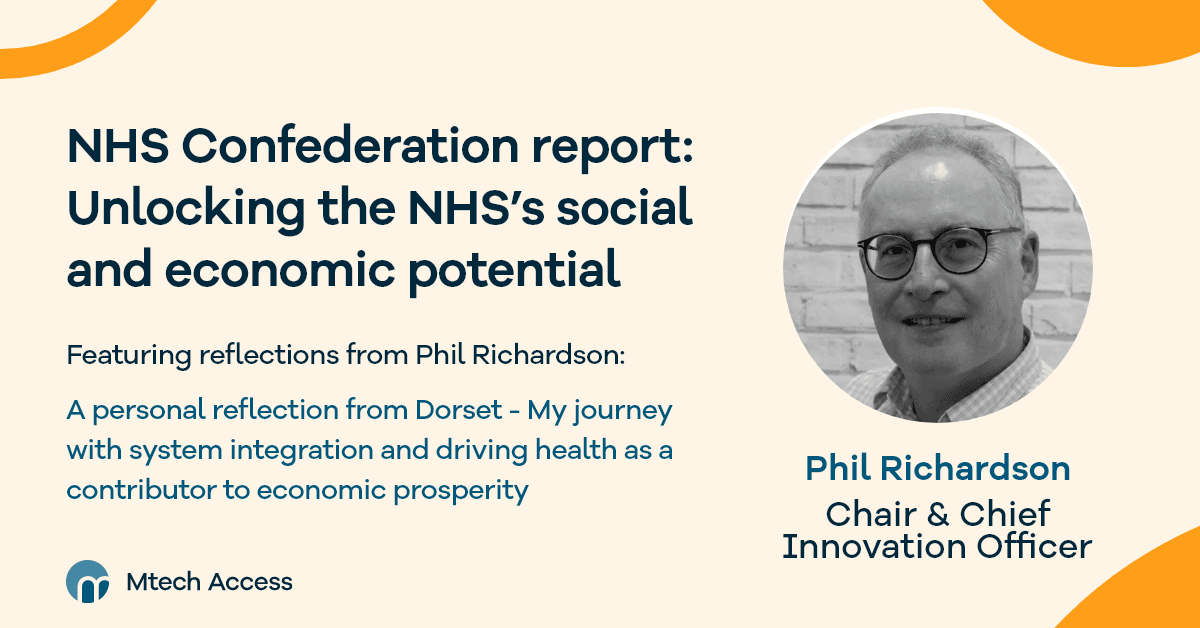
Today (9th December 2022) the NHS Confederation has published a report exploring health economics in the NHS: ‘Unlocking the NHS’s social and economic potential: creating a productive system’. The report examines the 4th purpose of Integrated Care Systems (ICS) – the role of the NHS in economic growth. It includes contributions from a range of leaders and innovators, including our own Prof Phil Richardson.
The NHS Confederation’s report looks at health economics from a macro perspective that goes far beyond the product specific health economic evaluation and modelling that our clients typically commission from HEOR agencies such as ourselves, at Mtech Access. It challenges readers, in the NHS and industry, to look at the wider picture. To truly examine the economics of health.
Prof Phil Richardson, who recently joined Mtech Access as Chief Innovation Officer and Chair, is one of several innovators who share their perspectives in the report. Michael Wood (Head of Health Economic Partnership, NHS Confed) invited Phil to share his reflections in light of his experiences in NHS Dorset, where Phil was responsible for the development of the Integrated Care Systems (ICSs), commissioning, digital, innovation, research, and system transformation.
We are delighted to be able to share Phil’s contribution in full below. However, we would highly recommend reading the full NHS confederation report.
We are also excited to announce that Michael Wood (Head of Health Economic Partnership, NHS Confed) will be our first NHS Whispers webinar guest of 2023. Michael will be joining Phil on Wednesday 18th January at 2.00pm to discuss the findings of this report, the role of NHS Confed and further explore this macro view of health economics in the NHS. Early-bird registration is now open here. Please look out for more details in the new year.
First though, here are Phil’s reflections, as published today in the NHS Confederation Report ‘Unlocking the NHS’s social and economic potential: creating a productive system’:
A personal reflection from Dorset – My journey with system integration and driving health as a contributor to economic prosperity, Phil Richardson

In 2017 I was offered the opportunity to join the Dorset local enterprise partnership board to help develop the industrial strategy. At the time, the board consisted of local businesses and the local authority. Whilst health is the biggest employer locally, there wasn't anyone from health on the board. Following a rigorous selection process, I was co-opted to bring my insight from industry and as a member of the Dorset ICS leadership team. This presented a real opportunity to look at health in a much broader context and through an economic and industrial development lens. I spent 18 months, working with a motivated LEP Executive and a passionate board. The One Health strategy has set the tone for investment, decision making and collaborative working. One Health | Dorset LEP
Challenges included changing the paradigm from a more traditional investment in infrastructure to a vision that focused on health and productivity in terms of physical health and well-being, and economic health and well-being. Like Dorset's clinical services review, the development of the strategy was evidence-based. Collectively, we gathered a significant amount of evidence that highlighted the local situation, the trajectory of plans, the engagement of health and well-being organisations, and the ambitions that were collectively held. Work done by the health and care partners in the system, developing a clear Sustainability & Transformation Plan and the evidence-based ICS plan were all used to create a shared understanding across business and public services. There was a clear focus on working together and stepping away from an organisational focus.
This work with Dorset LEP was part of a much bigger conversation around the NHS's role in the local economy. Dorset Council had done some initial investigation on the economic worth of having a local hospital to find that the economic contribution was significant. Dorset County Hospital's work on social value and the Clinical Commissioning Group’s (CCG’s) work on driving the integration across public services, academia, and industry meant that we had a rich, diverse set of experiences and thinkers focusing on how to make things better. Our digital and innovation teams have created a thriving community of small businesses that are actively engaged in improving care pathways. Our innovation and partnering teams have successfully built a network of like-minded individuals who can see the benefit of working together to improve not only clinical outcomes, but also the health of the local economy. Focus was also on changing any qualities and attention given to those that might need differential support rather than the more traditional standardised model. Bournemouth University took a proactive role in helping marshal together academia, research, innovation, and enterprise. They agreed to sponsor and host a breakthrough conference that attracted senior people from global digital, pharmaceutical, and biotechnology brands. They mingled with local researchers with an international reputation in health, public health, and social care, as well as south coast entrepreneurs who have been at the forefront of remote monitoring and diagnostics.
The CCG in Dorset has driven this work since starting the clinical services review (CSR) in September 2014. It was a bold strategic decision to step up to the emerging challenges around quality, workforce, finance, and care delivery. CSR was an evidence base needs-led programme to develop the future model of care for the Dorset system. It has been fundamental in redesigning the approach and the strategic thinking about the integration of care, the design of services, and the focus on ensuring that services are delivered closer to home. CSR provided the bedrock of what is now the integrated care system in Dorset.
The key to our overall approach has been integration. And this has been the golden thread through strategic thinking, planning and implementation. We created roles that worked across digital, service improvement, innovation, research, collaboration, system working, governance and transformation. It allowed us to work seamlessly across the different functions and collaboratively with partners across the system. We developed an integrated approach to innovation and research. Set up as Research Active Dorset to bring together all partners from across the patch, it has been a critical driver in bringing industry and the NHS together for innovation. This value-based thinking meant we were in good shape to set up a vaccine research hub for Covid research and, as a result, were one of the first systems to deliver research results that supported the national vaccine effort. A direct contribution to the economy. We have published our research strategy, which sets out an ambitious future to be a progressive, collaborative partner across the south coast and a valued partner in national and international innovation.
As a result of this new way of working, we have managed to secure industrial investment for a new histopathology laboratory, a clinical trials unit, and several health and industry collaboratives. We have a pipeline of investment that will help us tackle the key strategic issues that will help our local population better choose how they contribute to their communities because they will enjoy better health. To further build out our innovation ecosystem, we have been working on an organic intelligence approach named locally as the Living Laboratory. This hybrid physical and virtual space co-develops and co-delivers research and service delivery. It will exploit technology to create an engaging experience for those needing help and space for innovators and clinicians to imagine new and effective services. Our relationship with the AHSN, NIHR ARC, universities, local authorities, and industry is key to making this work. By working with a shared vision and a common purpose, the local authority has already commissioned architect plans and a potential co-located NHS site identified by University Hospitals Dorset for the first sustainable design influenced by Biomimicry.
The innovation ecosystem, including the Living Laboratory, will provide hard and soft data intelligence with insight through quantitative, qualitative and real-world evidence that will transform services and the business model. It will accelerate the evolution of how we work, identify and allocate resources, and emphasise the importance of strategic decision-making in helping people lead the best lives they can. It is much more than a medical model focusing on pathways and body parts; it gets to the true heart of care delivery by focusing on the needs of the person.
I've been immensely proud to be part of the leadership in Dorset that has developed this new thinking and approach and set the scene for the new integrated care board and the new integrated care partnership. There is a real opportunity to build on the bold decision to embark on a whole system CSR and the appetite to set up and grow teams that drive innovation, collaboration, transformation and partnerships. The boundless energy that has created an opportunity to develop a common purpose across the clinical, research, managerial, and commissioning space has been transformative. And an aim to succeed on an economic plan for health and well-being that will be better for the person, better for staff, better for local organisations and businesses, better for academia, global industry and all those that can see our shared goal of healthier communities.
The legacy of the work today sets the bar for what could be achieved in Dorset and frames the conversation for what other systems that choose to take out the whole system economic approach could achieve. There has also been significant benefit with the launch of this work in partnership with NHS Confederation and broad interest from other national and international systems.
Based on my 8-year journey to lead and drive an integrated approach to health and care, I would give my top five lessons learned in guiding this process for those who would like to jump-start their system approach:
- Give someone with imagination the resources and headroom to pull the thinking together
- Frame it as a health and well-being economy, not an operational fix
- Embrace diversity of thinking through a ‘mashup’ of organisations and experiences
- Do be pragmatic; accept the insight will come from outside your experience, your organisation, and the NHS
- Don't make this a business case; it's an experiment
With thanks to NHS Confed. This is an extract from their report: ‘Unlocking the NHS’s social economic potential: creating a productive system’.
Eager to hear more? Register here to join Phil and Michael Wood (Head of Health Economic Partnership, NHS Confed) in our webinar on Wednesday 18th January at 2.00pm. More details to follow.


